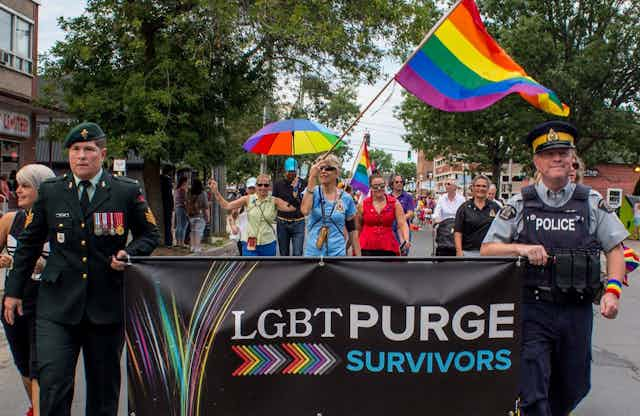In 1969, former prime minister Pierre Elliot Trudeau decriminalized “homosexuality” in Canadian civil society declaring “there’s no place for the state in the bedrooms of the nation.” Yet, the Canadian Armed Forces was allowed to continue officially discriminating on the grounds of homosexuality until 1992.
Using a little-known military law entitled, CFAO 19-20 Homosexuality, Sexual Abnormality Investigation, Medical Examination and Disposal the military systematically targeted and investigated all suspected soldiers, aviators or sailors.
Two of us, Lynne, a sociologist, and Carmen, a psychologist, carried out 126 interviews with LGBTQ+ soldiers and their partners between 1997 and 2010 for a study documenting their military experiences. The participants also included former military members who had been discharged on the grounds of homosexuality.
When this research began, Lynne had just retired after 16 years in the Canadian Armed Forces. In addition to personally having experienced the military’s eradication campaign, she knew many LGBTQ+ soldiers, sailors and aviators who were still serving, or had served, in previous years. Carmen experienced the reality of being partnered with an LGBTQ+ soldier during the purge. Together, they decided these untold stories needed to be documented.
Stalked, spied upon and threatened
Their research illuminated that the dehumanizing and humiliating treatment of LGBTQ+ soldiers, aviators, sailors and their partners was akin to being treated like prisoners of war and being tortured. Labelled as a threat to national security and an enemy within, LGBTQ+ soldiers experienced stalking, spying, threats, entrapment, forced confinement, lie detector tests, interrogations and physical and sexual assaults.
As one participant, Danni (a pseudonym), described:
“They [the military police Special Investigative Unit] locked the car. I kid you not. [They] marched me out [of work], one on either side of me, stuck me in the back of the freaking ‘K-car.‘ It was specifically intimidating. Then, [they put me] in the little four-by-six room and … said, ‘We’ve been told that you’re a practising homosexual.’”
Once found guilty of being gay, soldiers were discharged, most of them dishonourably. Participants spoke of lasting physical, emotional, psychological, financial and career traumas as a result of being investigated and purged from the military. For example, describing the aftermath of her ordeal, Issy recounted:
“I ended up with no family, no friends, no support. And that’s what was driving me nuts almost to the point of suicide … I’m pretty sure it could be said that I was clinically depressed because of the isolation, the guilt and the mixed messages that were in my mind.”
Psychologically broken and in fear of being discharged and publicly shamed, some participants divulged names of other LGBTQ+ soldiers, even their own partners. Others went deeper into the closet to protect themselves, their careers or their partner’s career. They experienced social policing of their gender and sexuality expressions. “If you didn’t do that [pass as heterosexual], you didn’t fit in, and the whole mob mentality would turn against you. So, 'you either fit in with it, or you became the target’” said Oliver.

Public apology and class-action lawsuit
In 2009, Carmen and Lynne looked for ways to obtain remediation and social actions such as an official apology, compensation for suffering, a military medal and commemoration. In 2014, they helped create the We Demand an Apology Network. The network brought together over 30 academics, LGBT Purge survivors and other stakeholders and allies who pressured the Canadian government for an official apology for the perpetrated discrimination.
Subsequently, Carmen and Lynne were approached to assist in preparing the lawyers involved in the class-action lawsuit — data from their study provided important evidence for the case regarding trauma suffered.
While the study focused exclusively on the military, Carmen and Lynne’s research findings and social action informed the content of the apology delivered by Prime Minister Justin Trudeau in 2017, and the LGBT Purge class-action settlement in 2018.
A new study: Why now?
The Canadian Armed Forces is currently struggling with continuing sexual misconduct allegations, and poor inclusion and diversity.
Discrimination against LGBTQ+ soldiers doesn’t stop just because a policy has been revoked. Once again, it is imperative to document the stories of LGBTQ+ soldiers and their spouses. This is why the original study is being replicated more than a quarter of a century after the end of the legalized discrimination. Interviews with serving LGBTQIA2S+ military and their partners are underway. Please share your military experiences with us.

The research methodology informing this work is based on the premise that the knowledge of marginalized people is essential to understand institutional power structures. Meaningful and positive social, cultural and policy changes are best achieved when marginalized perspectives guide these changes.

